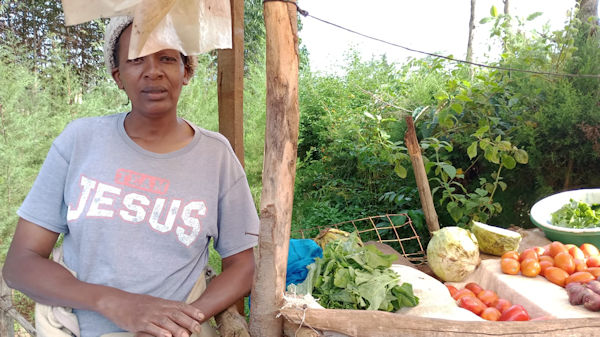Adams’ church runs a small micro-finance scheme to help women start up small businesses, or to expand the businesses they already have.
Micro-finance schemes have been used by many organizations to give people “a hand up rather than a hand-out.” The concept is simple: people receive a small loan (usually less than $100) which is repaid over a set period at low interest. When they have completely repaid that loan, they can get another until their business is fully established. These schemes are generally specifically targeted to women, because it has been shown that women are better at maintaining the repayments than men are.
In the scheme from Adams’ church the women are first assessed to see if their business idea is viable, and if they are capable of carrying it through. Then they receive some basic business training from Mary, Adams’ wife before they are given the loan. When they start their business (or expand the one they already had) they receive regular visits from Mary to encourage them and help with any challenges they may be facing.
On Thursday I had the privilege of meeting some of these women and seeing what they are doing. Some of them are single mothers, and the tiny amount they can make from this business is all that they have for their family to live on. For many the business of choice is a fruit and vegetable stall. They simply set up a kiosk with rough poles and a display area, and some kind of cover, then buy vegetables and fruit each morning in bulk and resell it during the day. They have to be able to judge well how much to buy, otherwise they could either run out of stock or have too much left over that is wasted.
Other challenges they face are tax – government officials go round the stalls to collect taxes according to how well the stall is doing. It sounds a bit like the tax collectors in the New Testament – and the issue of transporting their stock from the market to their stall.
Zipporah already had a small business selling fruit and vegetables, but the micro-loan has enabled her to buy more stock each day so that she is not running out of stock before the day ends. She said she was very happy to have the loan.

Evelyn also already had a business but the loan has enabled her to boost her stock. Lorna, on the other hand, was able to start up a business for the first time. Lydia has also started a business in a slum area, selling maize, vegetables and charcoal. (With an unreliable electricity supply and bottled gas being expensive, charcoal is often the fuel of choice for cooking, so is always in demand.)
Brigit has decided to go a different way. She has started making small items of jewellery and accessories. She works in a beauty salon, and they have given her permission to display her items in their counter until she can build the business to a point where she can go out on her own. She said that before she receive the loan she had been talking to her husband and saying that she would like to start a business, but they didn’t have the money, so when she received the offer of the loan it was like a miracle to her. She asked me to come and bless her house, which I happily did – two tiny rooms made of corrugated iron sheets with dirt floors. It reminded me of the first house I remember living in as a child, though I don’t remember ours being so small – but who knows, to a small child everything looks big.
Other loan recipients, who I didn’t get to meet because the rain had made the roads to their homes impassable, are making clothes or buying and reselling them.
These dear ladies have incredibly hard lives, and I admire them greatly. I wish I were a billionaire and could throw money at them.